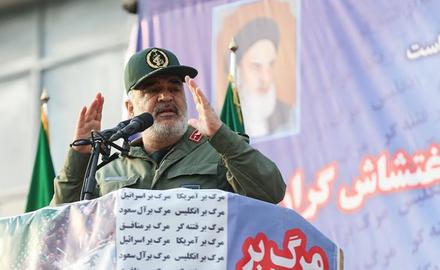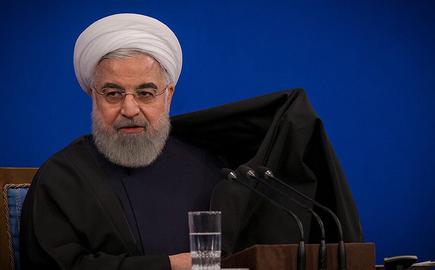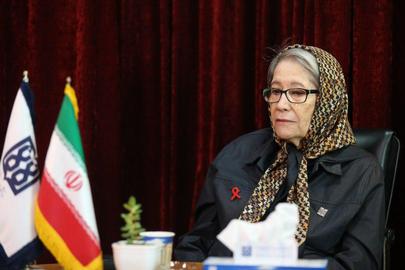As election day in the United States gripped the world, Iran’s Revolutionary Guards Corps decided to mark the day in its own way, with a public unveiling of a new missile program.
As the presidential election approached, more and more Iranian officials insisted the results would have no impact on the Islamic Republic and its citizens. This continued into election day, despite the fact that Iran’s financial markets responded to every twist and turn in the election, just as markets across the globe did. The Revolutionary Guards' unveiling ceremony was a probable attempt to prove the results were entirely insignificant and that Iran would continue to remind the world of its military might.
After weeks of early postal and in-person voting, the US presidential election came to a close on the evening of Tuesday, November 3. Counting continued in most states, and at the time of publishing, it had not been determined whether incumbent Republican President Donald Trump or Democrat candidate Joe Biden would occupy the White House for the next four years.
The world learned early on that the magic number was 270, the number of electoral college votes required for either candidate to announce victory.
But 270 is also an important number in Iran: it’s the number of days Hassan Rouhani has left as president, as his administration’s term comes to a close in nine months. The coincidental significance of the number 270 in the two countries, with their long history of hostility, gave rise to conjecture, superstition and witty predictions among Iranians, especially on the most popular social media platforms. The fact that it was being discussed at all suggested that Iranian officials’ insistence that the result of the US election was of no consequence was completely off the mark. In addition, financial markets around the world responded to the unsettled mood in the US, and Iran was no exception. All eyes were and are on the United States, and there was no point in pretending otherwise.
Enter the new missiles, a convenient distraction for Iran’s own electorate, and a handy device for reminding the world of the Revolutionary Guards’ power and influence in the country.
"It doesn’t matter to us ..."
On Tuesday, President Hassan Rouhani added his voice to the chorus. "We do not care who becomes president in the United States,” he told a cabinet meeting. "Our economic decisions have been made over the last few weeks, regardless of what happens in the United States or who is elected. It does not matter to us what goes on in the United States and who is elected.”
There was no mention of the Joint Comprehensive Plan of Action (JCPOA), the official name for the nuclear deal, but Rouhani did call on the United States to "return to the rule of law and all international and multilateral treaties" and show respect for the Iranian people: "Respect instead of sanctions,” he said.
The US, under President Trump, withdrew from the nuclear deal in May 2018. Exactly one year later, the Islamic Republic protested against the decision by reneging on some of its obligations under the JCPOA, including by increasing its uranium enrichment above the agreed threshold. At the same time, Iran insisted it wasn’t gaining anything from the deal anyway.
Rouhani's most recent remarks followed similar comments from the Supreme Leader Ayatollah Ali Khamenei. On Monday, November 2, Khamenei said in a televised speech that the Islamic Republic had "a calculated and clear policy" with regard to the United States, and that would not change with the "comings and goings" of US presidents.
Other political and military figures added their voices to the “it doesn’t matter” campaign too.
“The Unveiling of a Missile Launcher"
Then came the announcement, on November 3, from news outlets close to the Revolutionary Guards that a new missile system had been launched, just as the rest of the country’s media were paying attention to the US election.
Fars and Tasnim news agencies reported the unveiling of an "automatic and intelligent system of consecutive long-range ballistic missile launcher from the Revolutionary Guards’ Aerospace Force,” adding that none other than Hossein Salami, the commander-in-chief of the Revolutionary Guards, was a prominent presence at the event. Salami told his aerospace force: "Your fingers should always be on the trigger.”
He also spoke of the "rapid acceleration and decline of the enemies' power," but stressed that "even when the enemy is disintegrating and collapsing, it is still dangerous, just like a tall building collapsing."
The two news agencies provided few details on the time and place of the unveiling ceremony or the technical specifications of the missile launcher. Islamic Republic of Iran Broadcasting (IRIB) also presented a 34-second on television that was said to have been recorded at an underground location, and during which the presenter repeatedly emphasized the system's "uniqueness."
So why this news on this day? The message is two-fold: the Islamic Republic will not back down from its missile program. And the Leader of the Islamic Republic and his military arm, the Revolutionary Guards, will have the final say.
In fact, when the JCPOA was signed in 2015, the Revolutionary Guards Corps took steps to remind the Iranian people and the world of its influence and power with a similar unveiling.
Market Reactions and the Formation of Another "Headquarters"
According to reports from Iran, the country’s financial markets were affected by the US election news on Tuesday, as were many markets around the world. As news and commentary in the US continued, fluctuations were felt in the Tehran Stock Exchange index and the foreign exchange market. In one example, media reported that immediately after Donald Trump's first brief remarks that he was winning the election, the demand for dollars on Tehran’s Ferdowsi Street peaked.
It is well known that over the last two years or more, economic problems have dominated the lives of Iranians, and the Iranian government has put this at the top of its agenda.
In his speech on Monday, the Supreme Leader reiterated his own commitment to saving the economy, saying it was his main priority, followed by security and culture. However, he stopped short of putting forth a solution, stating that it was the job of Iranian “officials.”
His comments set in motion a familiar routine that has characterized the last three decades. Soon after his words went public, Iran’s media picked up on it, republishing what he said, commenting on and highlighting certain aspects, and making predictions of what impact his statements might have on decision-making and policy.
The country’s market regulation headquarters held a meeting soon after, during which the director general of customs announced a new law to facilitate the process of clearing basic goods. He announced the establishment of an organization that would issue "heavy punishments and sentences" for people, groups or businesses selling goods at inflated prices. Officials from the Ministry of Industry, Mines, and Trade and several other institutions also repeated sections of Khamenei's speech to show their commitment to cracking down on unfair prices for Iranian citizens.
The Revolutionary Guards chimed in too. Commander-in-Chief Hossein Salami announced the formation of a "price control headquarters" and told IRIB that the decision was taken during a meeting to "coordinate and enhance the capacities of the Revolutionary Guards and the Basij [voluntary Guards force] and the regulatory and executive bodies to control prices and combat the practice of overselling."
The front pages of Tuesday's newspapers in Tehran were mainly devoted to Khamenei's remarks and pictures of the two US presidential election rivals.
Websites and Telegram channels with links to the Revolutionary Guards also continued their campaign to avenge the assassination of Ghasem Soleimani in January. The commander died after a US attack on his convoy in Iraq.
While the world was watching US citizens go to the polls, the Islamic Republic deployed well-worn tactics to draw attention away from what was going on with “the Great Satan.” Its message was of powerful new missiles, a buoyant economy and a show of strength on the international stage, all the while pretending what happened in the US was entirely irrelevant.
visit the accountability section
In this section of Iran Wire, you can contact the officials and launch your campaign for various problems



























comments